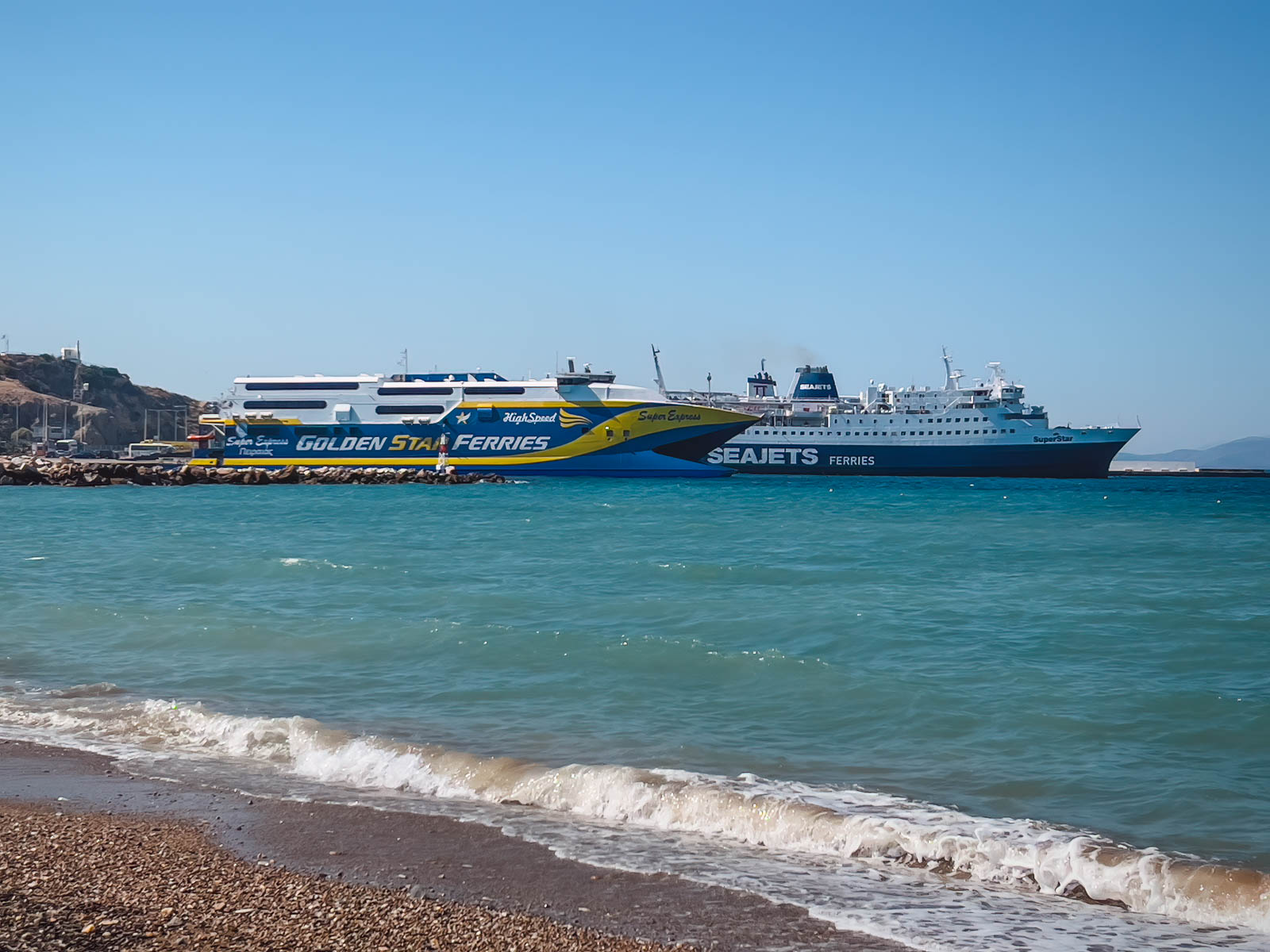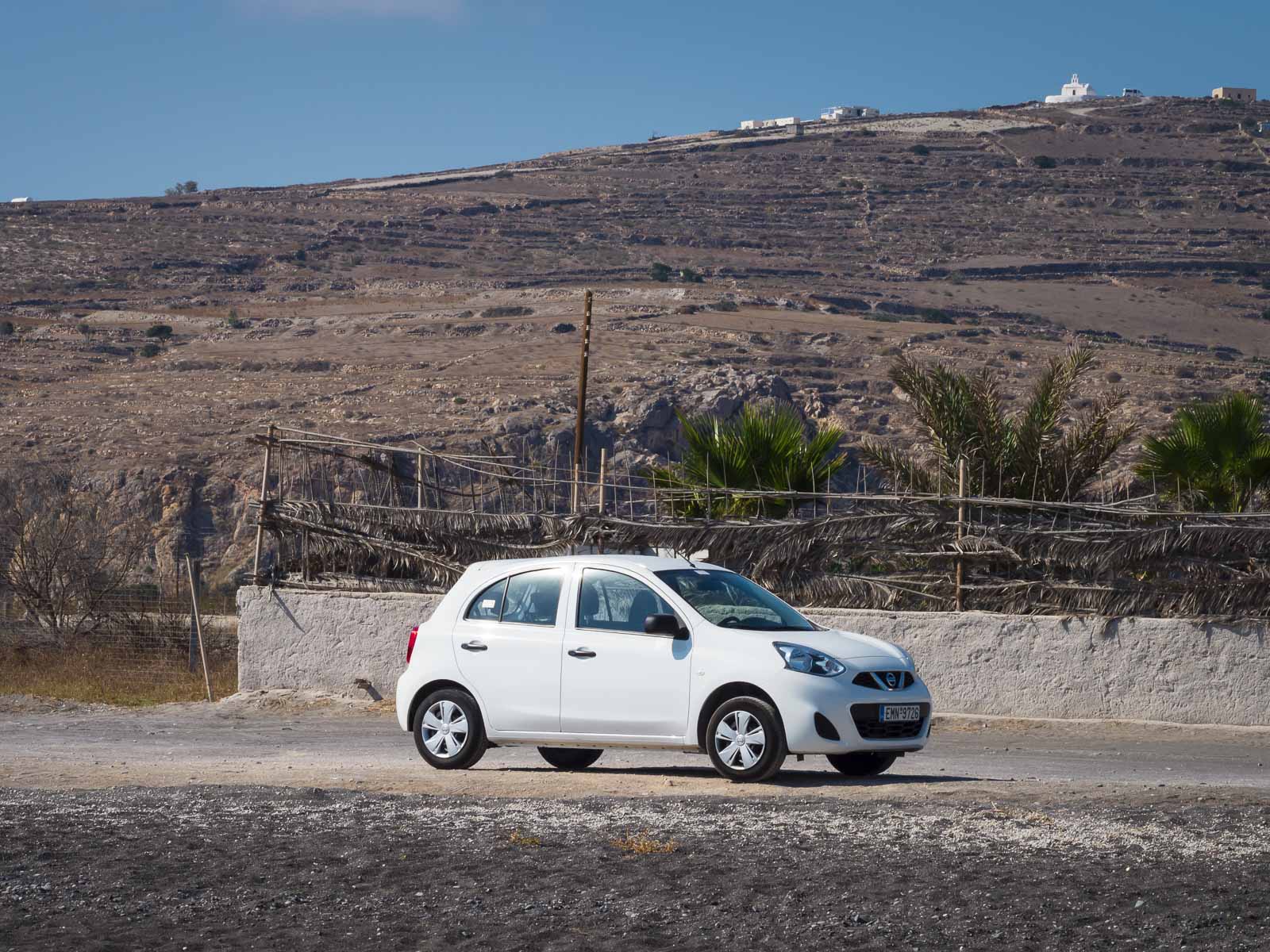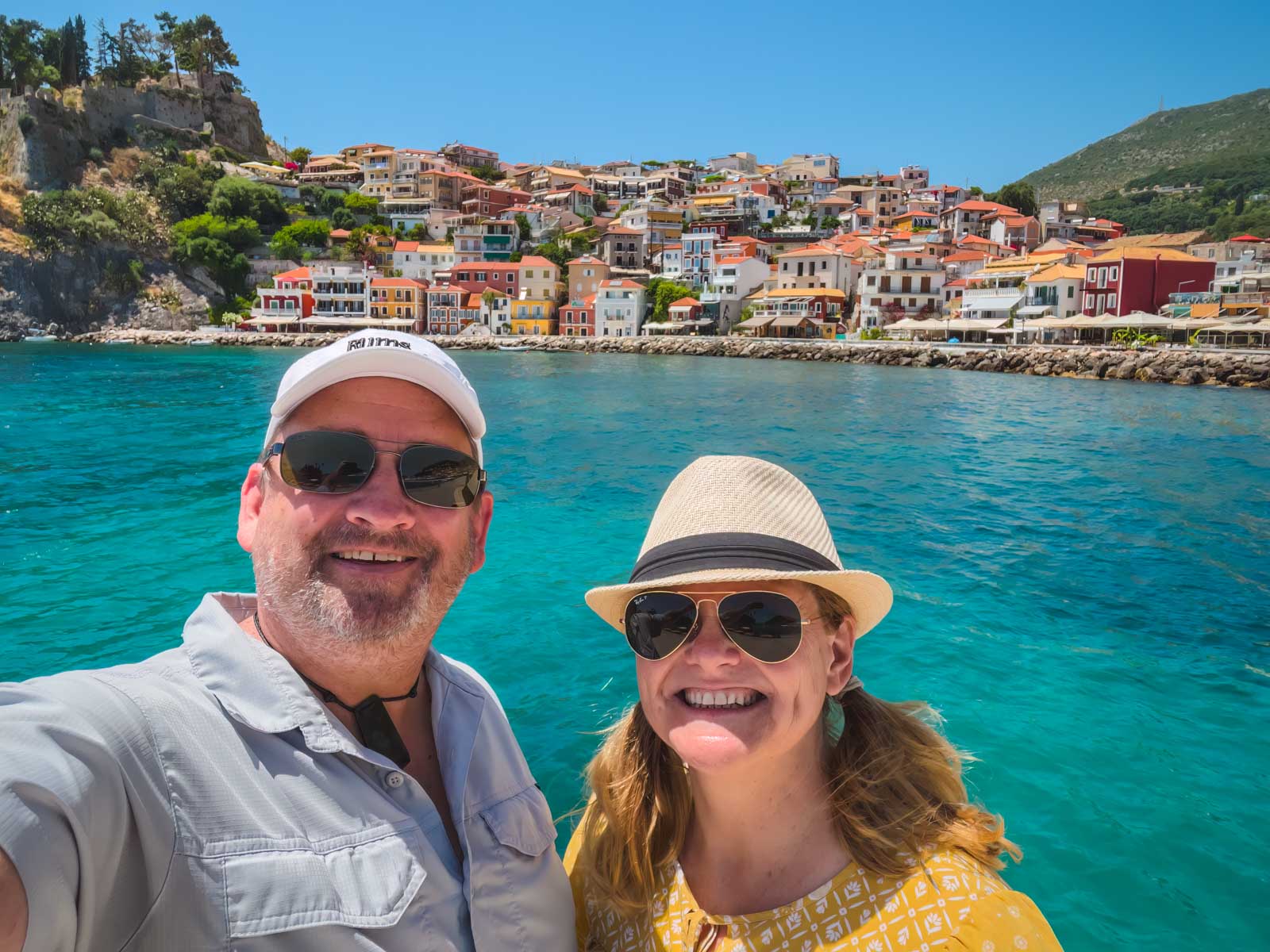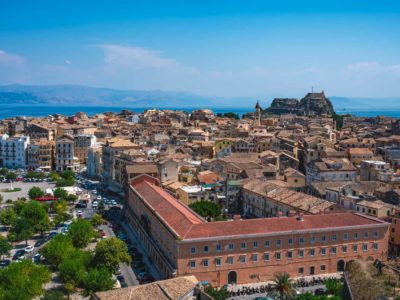Is Greece expensive to visit? That is the question many people have before traveling to this dream destination. We are here to help you answer that question. A trip to Greece is one of those holidays that is a massive grey area when it comes to budgeting. Out of all European countries, prices vary from luxury to a budget-friendly getaway. You could easily enjoy some of Greece’s best beaches and holiday experiences cheaply by eating street food, catching overnight ferries, and staying in budget hotels. However, you could just as easily book a luxury stay somewhere like Santorini, book private tours, and eat Michelin-worthy Greek food. So, what is the answer? How much does a trip to Greece cost? Can you travel to Greece on the cheap or is Greece expensive? Let’s find out.
Table of Contents
Is Greece Expensive? Budgeting for a Trip to Greece

This guide will give you a total rundown answering the question, is Greece expensive? We are going to cover everything from accommodation to transport and food. You can travel to Greece cheaper than most European countries. There are some great deals, and we have found five-star resorts for three-star prices. After reading this guide, you’ll leave with a solid idea of how much your vacation to Greece will cost and what sort of budget travel tips will help you stretch your dollar. We have spent a lot of time in Greece and have a handle on what things actually cost. Grab a pen and paper, and let’s plan a budget together.
Accommodation Costs in Greece

Overall, accommodation in Greece will be lower than in other European countries. Greece is where you can reliably find many hostels and homestays, especially on the quieter islands when island hopping. You should easily find a hostel or mid-range hotel between $40 and $80 per night, if not cheaper. In two weeks, this would cost you between $560 and $1,100 – a pretty budget-friendly price if you ask us.

Many hostels and mid-range hotels in Greece also include free breakfasts in their total accommodation cost. Keep your eye out for these, as paying for free breakfasts reduces your actual costs while holidaying and helps save money when visiting Greece. Sound brilliant so far?
The only stipulation is that if you visit particularly quiet or small areas, accommodation might sell out quickly if there are only a few options. We’d advise booking anywhere from 18 months to 6 months in advance to guarantee you can take advantage of these average prices. When booking accommodation that far in advance you can save big time. Accommodation prices in Greece are notoriously reasonable. Still, they vary depending on availability, so don’t miss out by being slow to book a budget hotel.

Of course, Greece also has luxury hotels, like the Santorini cave hotels. While the cheapest Greece trip may entail hostels and budget hotels, a luxury hotel is a must on a luxurious Greek holiday. Upscale accommodation costs are what can make Greece expensive. Expect to pay upwards of $160 per night at a luxury hotel, and prices can reach thousands if you splurge on a novelty five-star base. If you stay in a luxury hotel in Greece, you’ll spend around $2000 on accommodation for two weeks.

Another thing that spikes accommodation prices in Greece is where you choose to stay. You’ll find unlimited access to budget and mid-range hotels on much of the mainland (which is much less touristy than islands like Zante, Corfu, Mykonos, and Santorini). Similarly, on lesser-visited islands like Folegandros or Naxos, you’ll find fewer tourist traps and more reasonably priced homestays and independent hotels.
The average hotel price in Naxos is around $70 per night, whereas, in Santorini, the average hotel price per night is $150. You can quickly see how skewed accommodation prices can get depending on location and the demand of other tourists. Accommodation prices rise the most when you choose one of the most famous Greek islands. Especially when the destination in Greece has a novelty or ‘luxury’ status like Mykonos or Santorini.
So, as a whole, accommodation in Greece can be split into three main brackets: budget, mid-range, and luxury. This is what to expect for each budget level.
Budget Accommodation
Accommodation for a budget holiday will cost around $500-600 for two weeks. It will likely be in a hostel or budget hotel in a quiet area in Greece.
Mid Range Accommodation
Mid-range accommodation will cost around $1000-1200 for two weeks. It may be on one of the more popular islands. Still, it will typically be in a homestay or other mid-range hotel option.
Luxury Accommodation
Luxury accommodation starts at around $2000 for two weeks. It can be anywhere in Greece, including its most touristy, sought-after areas.
Transportation Costs in Greece

Ferries And Busses
Transportation in Greece is typically meager in cost. This is because public transportation is so normalized when traveling around Greece. Much like inter-railing Europe encourages slow travel, budget trains, and train passes, traveling around Greece tends to include island hopping and road trips. Ferry tickets cost as little as $20-80 for a one-way ferry. And if you choose one of the overnight ferries, you can actually save yourself on accommodation.
Besides ferries (we’ll come back to them later), buses cost an average of $4.50 for a 24-hour ticket – never paying more than a few dollars for a single ticket. Even if you splurge on car rentals, you can pay as little as $15 to $30 per day, depending on how long you have had your license and your age. Overall, in the average two-week holiday, you shouldn’t spend more than $600 on transportation in Greece.

To travel around Greece cheaply, slower ferries and overnight ferries are the way to go island hopping. Not only do you save on accommodation on an overnight ferry, but the prices can be reduced by up to 50%.
You can massively reduce your transportation costs if you are willing to rough it on the slow ferry or cozy up on the ocean for a night. If you are a budget traveler seeking an affordable destination, book overnight ferries, and you’ll have zero issues sticking to a transportation budget of under $500.
Renting a Car
Another popular way of navigating your way around Greece is with a rental vehicle. Car rentals are an absolute breeze to organize on a Greece trip, and as we mentioned, they can cost as little as $15 to $30 per day. With a car rental, you’ll need an international driving permit and suitable travel insurance to play it safe.

Some car rental companies also require a credit card to secure the booking. However, once you’ve organized a car rental you’ll be free to explore the most off-the-beaten-track areas in Greece. And you can even take the car island hopping if you book one of the larger ferries that carry vehicles.
Fuel in Greece is also ridiculously cheap, averaging at around $2 per liter at the time of writing. Relying on a rental car for transportation in Greece costs about $500 for two weeks, while if you want to catch car ferries as well, you should budget just under $1000.
If you are adventurous, you could bring your own car and combine a Greece trip with a visit to some other European countries. This route makes sense for those based in Europe already, especially if you have plenty of time.
If you have more than 3 weeks, this option is feasible. If you bring your own car, you’ll incur fuel costs, but you won’t be paying rental expenses. Budget around $0.18 per mile you drive in Western Europe and much less in Greece.
Flights
Finally, flights must be mentioned. If you don’t decide to drive to Greece – totally fair enough as that is a pretty niche option – then a direct flight to one of Greece’s significant hubs will probably be your method of arrival. The initial flight will be your main cost when visiting Greece.
However, what is worth mentioning is that most flights transit in major hubs like Athens and Corfu before traveling to other islands and smaller destinations. So direct flights to places like Santorini are extremely limited or entirely non-existent. Budget around $200 for domestic flights in Greece, especially in peak season. There just isn’t the infrastructure to cope with such a high volume of flights.

Some islands like Ithaca are so small that they don’t even have an airport. To reach certain areas, your only options are a ferry, booking a car rental, or hopping on a local bus to the ferry.
Budget Transportation
Budget transportation in Greece involves catching slow ferries, overnight ferries, and local buses. In this scenario, budget less than $500 for a two-week holiday.
Mid Range Transportation
Mid transportation in Greece would involve the cost of a car rental and occasional car ferry. And for this, we’d recommend budgeting around $900-1000 for two weeks, depending on how many car ferries you take.
Luxury Transportation
Luxury transportation around Greece likely involves a couple of domestic flights, private day trips instead of slow ferries, and a car rental or shuttle service. Depending on your itinerary, we suggest budgeting around $1500 for two weeks.
- For international flights from North America you can plan on costs from $350 – $500 USD (a little more from Canada and the West Coast)
- Flight from Australia can range from $700 – $2000 USD
- Flights from London can be as low as $100 USD
Food Prices in Greece

Greek food prices tend to be low. Traditional greek fast food like a souvlaki or gyro costs as little as $5, and if you get self-catered accommodation, you can spend just $30-40 at the supermarket per week.
If you are on a strict budget, there is no reason why you couldn’t expect to pay less than $100 for two weeks if you grocery shop and grab a few takeaway treats. Choosing to cook yourself is one of the best ways of saving money. Are you up for the challenge? It is a super simple way of reducing your total food cost.

We always book hotels offering complimentary breakfasts. On expensive islands especially, this can hugely reduce your outgoings on food. You could enjoy a complimentary breakfast, buy street food for lunch, and then eat at a mid-range restaurant for dinner to try some traditional Greek food.
Mid-range restaurants cost around $20 per person. However, this varies depending on which island you stay on, whether it is high season, and your diet.
Obviously, a Greek salad will cost less than a medium-rare steak. But even if you decide to splurge on fresh seafood and a house wine occasionally, you can still keep your meal cost low.
Simple decisions like sticking to local Greek wine rather than world-known brands can make a huge difference. If you stick to this arrangement and are conscious of dish choices, you could budget around $350 for two weeks for food – and that is eating out every evening.

Food prices in Greece can be a little more expensive if you are eating out for three meals a day. And, of course, if you choose upmarket restaurants repeatedly, you’ll notice that meal costs add up.
The more expensive restaurants start at around $30 per person for a standard meal, not including service charges. If you eat out at upscale restaurants for three meals a day, we suggest budgeting around $700-800 for a two-week holiday in Greece.
Cheap Food in Greece
If you are sticking to a budget in Greece, your best choice is to find self-catered accommodation and rely on grocery shopping. You may wish to be flexible about a few takeaway-style dishes while out on day trips, though (and besides, you have to try some traditional dishes while in Greece). But even then, your costs should be around $100 for two weeks if you are budget conscious.
Mid-Range Food in Greece
On a mid-range budget, we’d hope that you have already chosen a hotel with a complimentary breakfast service. That leaves you with just two meals a day; lunch and dinner. If you eat out for dinner at a moderately priced restaurant and get street food for lunch, you can budget $350 on food for a two-week stay.
Luxury Food in Greece
We don’t blame you if you want luxury food in Greece. It is one of the most delicious cuisines on Earth, after all. If you eat out for three meals a day, you can expect to spend around $50 per day per person. Over two weeks, this will cost approximately $700.
Cost of Activities in Greece

Your Greece trip cost massively depends on your activity choices. But this is also the part that will most impact your experience, so we suggest clarifying what you want to see and do in Greece. Then you can adjust your food, transportation, accommodation, and other spending budgets to allow for the Greek activities you really want.
You don’t want to leave Greece with regrets. Especially considering the amounts of food tours, historic sites, boat trips, and all the history and stories about the Ancient Greeks. A vacation in Greece is one in a lifetime for many – so set aside at least an hour or two to see what you’d love to do in the places you are visiting.

As a general rule, you should budget around $25-30 per day when it comes to entertainment in Greece. This price should include guided excursions to see the Santorini Volcano and Hot Springs and self-guided things like museum entrance fees.
If you want to do something extra exciting like a luxury Catamaran Cruise or a scuba diving PADI course, you might need to set aside another couple hundred dollars for your stay in Greece. Budgeting around $25-30 daily and setting aside extra for any significant activities is best.

It is worth adding that island hopping can quickly add up if you choose private tours rather than public transport and slower ferries. If you can, catch ferries when island hopping, even if it means staying in a different area or island overnight.
Budget Activities in Greece
If you want a low-budget experience in Greece, most of your activities will be independent rather than guided. For instance, catching a ferry to a different island on a day trip rather than joining an organized tour. And visiting local museums and small bars rather than one of the top three nightclubs on TripAdvisor. You can easily spend less than $280 in two weeks.
Mid-Range Activities in Greece
A mid-range approach to activities in Greece is much more balanced with guided tours and independent exploration. You might even factor in the occasional night out at a popular nightclub. With three to four organized tours and two nights out, you can still budget less than $420 for two weeks.
Luxury Activities in Greece
Luxury activities in Greece pretty much have an open-ended budget. However, if you want to take private daily tours (which average $110 per person) and complete extras like bungee jumping or scuba diving, we suggest a minimum budget of $1600 for two weeks.
Budget for the Mainland and Greek islands

Now that we’ve looked at the main costs of traveling in Greece, it is time to check the overall budget for a two-week trip in Greece. This is our final breakdown of the cost of a trip to mainland Greece or its beautiful islands.
Budget: 2 Week Holiday on the Greek Mainland and Greek Islands

The total budget for a two-week budget-friendly holiday to Greece is $1,500. If you are on a tight budget, you should visit the cheapest Greek island or destination that appeals to you, avoiding the crowds and higher season, which brings higher prices.
To fit a $1,500 budget, you’ll choose budget rooms at a homestay or hostel that provides self-catered accommodation. You’ll primarily use ferries and rely on grocery shops. Your sightseeing and activities will be capped at $20 per day and mainly involve independent exploration of attractions.
Mid Range: 2 Week Holiday on the Greek Mainland and Greek Islands

If you travel Greece on a mid-range budget, your total cost will be around $2,800. On a mid-range budget, you have lots more wiggle room to enjoy things like meals out and a few guided activities and day trips. To fit a $2,800 budget, you’ll eat out twice daily and aim to find a hotel with a complimentary breakfast – popular amongst mid-range hotels.
You will enjoy a few nights out in nightclubs and take three to four guided tours, otherwise exploring independently. With the extra budget, you can visit some popular islands using ferries. But we’d still recommend sticking to shoulder season to keep costs low on the most touristy islands.
Luxury: 2 Week Holiday on the Greek Mainland and Greek Islands

If you are on a luxury budget, it is easy to spend loads in Greece. For this reason, we recommend a minimum budget of $5,800. A five-star hotel alone costs an average of $160 per night, which is $2,000 for two weeks. A $5,800 budget bags you a luxury hotel, plus private tours of historic sites and expensive food.
The budget also accounts for the fact that you’ll be eating out for three meals daily. Typical prices of meals cost an average of $30 per person at an expensive restaurant in Greece; you quickly spend $50 per day on a luxury food budget. This totals $700 per person for two weeks.
How much you can spend on a luxury Greek holiday is pretty uncapped. Some of the most expensive accommodation costs are over $1000 per night, so these prices could rise rapidly depending on your choices. However, $5,800 is the perfect amount to set as an average budget or minimum if you want to experience Greece through a luxury lens.
So, is it cheap to Go to Greece?

When planning to visit Greece, costs are usually at the forefront of your mind – especially if you plan to island-hop or use lots of public transport. But you’ll be pleasantly surprised by the average price of a vacation in Greece and how you can save money in Greece.
Two weeks in Greece should cost around $2800 on a mid-range budget. And if you are visiting Greece on a budget you could make that $2800 last nearly a month with hostels, overnight ferry tickets, and cooking or eating street food to save money.
Of course, consider some general advice about visiting Greece, such as avoiding the high season. The high season is not only expensive but also super crowded. Staying in the shoulder season, you’ll find fewer crowds, lower ferry prices, and a more budget price range for tours and activities. Check your credit or debit card beforehand, too, as some cards offer zero foreign transaction fees which can save you a small fortune.

Looking for more inspiration about visiting Greece? These are our top recommendations about the best places to visit in Greece and the best cities. Greece is one of those of our favourite countries in the world and we go back again and again. We can never get enough of it!
We’ve travelled in luxury and on a budget, and both experiences have been just as fulfilling. There are so many ancient ruins, beautiful beaches and fascinating cities, that no matter what you do in Greece or what your budget, you will love it!
Plan Your Next Trip to Greece With these Resources
- 21 Best Greek Islands to Visit
- 23 Best Beaches In Greece to Visit
- Places to Visit in Epirus – The Best Kept Secret in Greece
- 22 Best Things to Do in Mykonos, Greece
- The Best Things to Do in Athens, Greece
- The Best Places to Visit in Santorini, Greece
- Things to do in Meteora Greece – More Than Monasteries
- The Ultimate Guide to Costa Navarino, Greece
- Things to do in Zakynthos, Greece



